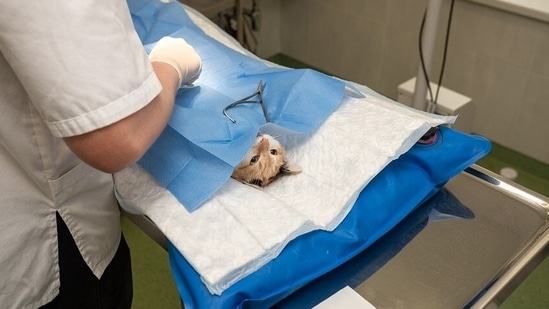Is it a good idea to get your pet sterilised? Know when is the right time
Sterilisation has many benefits for both male and female pets from cutting risk of cancer to reducing aggressive behaviour.
To sterilise their pets or not is a decision pet parents have to take at some point. Sterilisation is a procedure in which a part of your pet's reproductive organ is removed to permanently stop it from reproducing. It is commonly done on male and female dogs, cats, rabbits and guinea pigs. Sterilisation makes pets less prone to certain illnesses like cancer and tumours and may fix behaviour issues in aggressive pets. Sterilisation is safe and although it is a common surgery, one needs to follow post-surgical tips for better recovery. (Also read: 5 possible reasons behind your dog's laziness)

"Sterilisation is a set of commonly undertaken procedures designed to render a male or female pet incapable of reproduction. Before we come to conclusion whether it’s good, bad, ethical or unethical, it is important to understand the process first, says Dr. Dheeraj Bhardwaj BVSc & AH (Hisar), MS (Australia), is founder Apollo Vets, Dwarka in an interaction with HT Digital.
The most common methods of sterilisation are:
• Ovariohysterectomy: It involves removal of both ovaries and the uterus in female dogs and is known as spaying.
• Castration: It involves removing the testicles in male pets, known as neutering.
Telling us more about the procedures, Dr Bhardwaj says the above-mentioned surgeries are done under general anaesthesia and after the surgery, the vet may keep the pet under observation for a couple of hours to several days depending on various factors like age, overall health, and reaction to anaesthesia. A pre-anaesthetic check-up or blood work is always advisable and one must follow their vet’s instructions to keep pet safe and healthy.
Should one get their pet sterilised?
There are different benefits for sterilising your male and female pets. What's common is, the procedure keeps certain illnesses at bay.
Sterilisation in male pets
"Sterilisation has many benefits. Neutering your male pet helps in improving his or her overall health, may reduce the chances of testicular cancer, and also reduces prostate problems. Behavioural problems like aggression can also be avoided by early neutering. Your pet would be less likely to mount other dogs, people, and objects, and there would be less aggression between males. Pet parents should keep in mind that neutering your male pet does not guarantee to resolve all behavioural problems. There is a correlation between undesirable behaviours and testosterone levels. Neutering does not eliminate the hormone completely; it only reduces the testosterone levels in the body," says the veterinary doctor.
Sterilisation in female pets
"Spaying your female pets is also really helpful. It may prevent ovarian tumours, pseudo (false) pregnancy, mammary tumours, and above all your pet has no risk of pyometra which can be a nightmare for female dogs. Pyometra may require emergency surgery. Once spayed they’ll no longer go into heat, it decreases undesirable straying, and there would be no unwanted litters," says Dr Bhardwaj.
Know when is the right time
Ideally around puberty (around 7-8 months old) is ideal for sterilisation. The age for onset of puberty depends on the size and breed of the pet. You can also get sterilisation any time after the puberty. It would be best to ask your vet to know the best timeto spay or neuter your pet. Each pet is different and will require a specific treatment plan. Trust your vet for the best advice and treatment.
After care post sterilisation
For a few days after the surgery, make sure your pet remains in a quiet place and monitor his or her appetite or activity level.
"Your vet might suggest some lifestyle changes to maintain your pet’s overall health and wellbeing. Adapt his or her diet to avoid excess weight gain which could cause health problems like obesity, osteoarticular disorders (arthritis), cardiac problems, etc. The right combination of a well-balanced diet and regular exercise will help in preventing various health issues," says the vet.
Is sterilisation expensive
The cost of your pet’s sterilisation surgery is a lot less than the cost of potential treatments from health complications that might arise in the future.
"The impact of sterilisation goes much further than your home. It helps the community by preventing the birth of unwanted litters. Sterilisation is directly synonymous to responsible pet parenting, and you should definitely consider it," says Dr Bhardwaj.
Catch your daily dose of Fashion, Health, Festivals, Travel, Relationship, Recipe and all the other Latest Lifestyle News on Hindustan Times Website and APPs.



